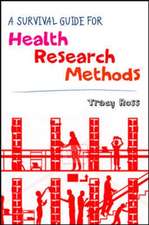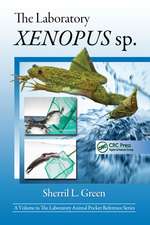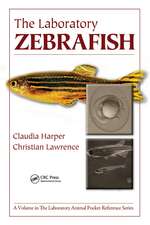Complex Systems and Computational Biology Approaches to Acute Inflammation
Editat de Yoram Vodovotz, Gary Anen Limba Engleză Hardback – 14 aug 2013
| Toate formatele și edițiile | Preț | Express |
|---|---|---|
| Paperback (1) | 1411.17 lei 43-57 zile | |
| Springer International Publishing – 5 noi 2021 | 1411.17 lei 43-57 zile | |
| Hardback (2) | 949.42 lei 43-57 zile | |
| Springer – 14 aug 2013 | 949.42 lei 43-57 zile | |
| Springer International Publishing – 4 noi 2020 | 1418.27 lei 43-57 zile |
Preț: 949.42 lei
Preț vechi: 1157.82 lei
-18% Nou
Puncte Express: 1424
Preț estimativ în valută:
181.67€ • 190.19$ • 150.32£
181.67€ • 190.19$ • 150.32£
Carte tipărită la comandă
Livrare economică 07-21 aprilie
Preluare comenzi: 021 569.72.76
Specificații
ISBN-13: 9781461480075
ISBN-10: 1461480078
Pagini: 307
Ilustrații: XI, 291 p.
Dimensiuni: 155 x 235 x 25 mm
Greutate: 0.56 kg
Ediția:2013
Editura: Springer
Colecția Springer
Locul publicării:New York, NY, United States
ISBN-10: 1461480078
Pagini: 307
Ilustrații: XI, 291 p.
Dimensiuni: 155 x 235 x 25 mm
Greutate: 0.56 kg
Ediția:2013
Editura: Springer
Colecția Springer
Locul publicării:New York, NY, United States
Public țintă
ResearchCuprins
An overview of the Translational Dilemma and the need for Translational Systems Biology of inflammation.- Part I: Complex Systems Methods and Applications.- Translational Equation-based Modeling.- Agent-based Modeling in Translational Systems Biology.- Analysis of Heart Rate Variability.- Analysis of Ventilatory Pattern Variability.- Part II: Translational Modeling of Sepsis and Trauma.- Disorder of Systemic Inflammation in Sepsis and Trauma: A Systems Perspective.- Multi-scale equation-based models: Insights for Inflammation and Physiological Variability.- Integrating Data Driven and Mechanistic Models of the Inflammatory Response in Sepsis and Trauma.- In silico Trials and Personalized Therapy for Sepsis and Trauma.- Part III: Translational Modeling of Wound Healing.- Disorder of Localized Inflammation in Wound Healing: A Systems Perspective.- Equation-based Models of Wound Healing and Collective Cell Migration.- Agent-based Models of Wound Healing.- Part IV: Translational Modeling of Host-pathogen Interactions.- Modeling Host-Pathogen Interactions in Necrotizing Enterocolitis.- Modeling Host-Vector-Pathogen Immuno-inflammatory Interactions in Malaria.- Part V: Future Perspectives.- Translation to Implementation.- The Rationale and Implementation of Translational Systems Biology as a new Paradigm for the Study of Inflammation.- Index.
Textul de pe ultima copertă
The Translational Dilemma, the difficulty in achieving effective translation of basic mechanistic biomedical knowledge into effective therapeutics, is the greatest challenge in biomedical research. Nowhere is this more apparent than in understanding and manipulating the acute inflammatory response in the settings of sepsis, trauma/hemorrhage, wound healing, and related processes. The burgeoning fields of complex systems analysis and computational biology offer researchers a pathway towards addressing the Translational Dilemma. Complex Systems and Computational Biology Approaches to Acute Inflammation presents the current state of the art of multi-disciplinary and systems-oriented research approaches to complex diseases arising from and driven by the acute inflammatory response. The chapters in this volume provide an introduction to different types of computational modeling, and how these methods can be applied to specific inflammatory diseases, with a focus on providing readers with a roadmap for integrating advanced mathematical and computational techniques with traditional experimental methods. By presenting the role of computational modeling as an integrated component of the research process, Complex Systems and Computational Biology Approaches to Acute Inflammation offers a window into the future of biomedical research.
Caracteristici
Provides an overview of the need for Translational Systems Biology of inflammation
Examines future perspectives of translational modeling and its implementation
Reviews the current state of complex systems and computational biology and its relation to inflammation
Examines future perspectives of translational modeling and its implementation
Reviews the current state of complex systems and computational biology and its relation to inflammation
Notă biografică
Dr. Yoram Vodovotz is currently a Professor of Surgery, Immunology, Computational and Systems Biology, Bioengineering, Clinical and Translational Science, and Communication Science and Disorders at the University of Pittsburgh School of Medicine. His research focus is the systems biology of inflammation. He is the Director of the Center for Inflammation and Regeneration Modeling at the McGowan Institute for Regenerative Medicine, a co-founder and past President of the Society for Complex Acute Illness, and a co-founder of Immunetrics, Inc., a Pittsburgh-based company that is commercializing this mathematical modeling work. He has published over 300 manuscripts, including three books.
Dr. Gary An is a Professor of Surgery and Vice-Chairman for Surgical Research in the Department of Surgery at the University of Vermont Larner College of Medicine. He is a founding member of the Society of Complexity in Acute Illness and past president of the Swarm Development Group, one of the original organizations promoting the use of agent-based modeling for scientific investigation. In addition to being an active trauma/critical care surgeon he has worked on the application of complex systems analysis to sepsis and inflammation since 1999 and consists of development of mechanism-based computer simulations and integration of machine learning and artificial intelligence with multi-scale simulation models for discovery of therapeutic control modalities.
Dr. Gary An is a Professor of Surgery and Vice-Chairman for Surgical Research in the Department of Surgery at the University of Vermont Larner College of Medicine. He is a founding member of the Society of Complexity in Acute Illness and past president of the Swarm Development Group, one of the original organizations promoting the use of agent-based modeling for scientific investigation. In addition to being an active trauma/critical care surgeon he has worked on the application of complex systems analysis to sepsis and inflammation since 1999 and consists of development of mechanism-based computer simulations and integration of machine learning and artificial intelligence with multi-scale simulation models for discovery of therapeutic control modalities.






